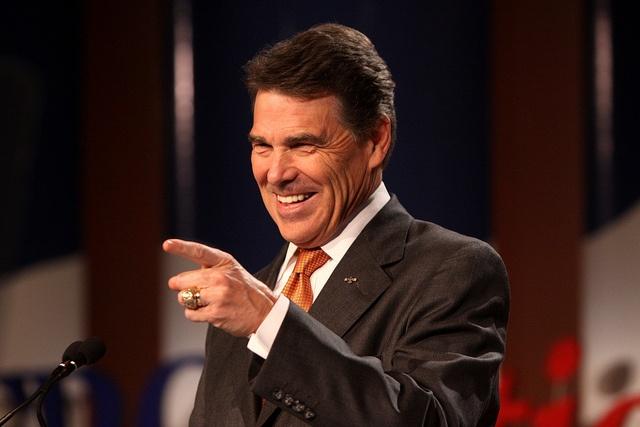
Editor's Note: A version of this post originally appeared on the Natural Resources Defense Council's Expert Blog.
By Elizabeth Noll
When Rick Perry faces his Senate confirmation hearing on Thursday, the former Texas governor’s goal will be to convince all of us that he’s up to the task of running the U.S. Department of Energy (DOE).
America has enjoyed years of incredible clean-energy progress, and its senators need to make sure this climate denier won’t hamper our nation’s clean-economy momentum, costing jobs and raising our energy bills.
Moving backward on clean-energy progress is not an option. Wind and solar power are cost-competitive with fossil fuels in some states. And 2.5 million Americans are employed in the clean-energy sector in all 50 states.
In fact, as NRDC’s recently released Fourth Annual Energy Report shows, a clean-energy revolution is underway, decarbonizing the electric grid through carbon-reduction targets, energy-efficiency gains, and renewable-energy additions.
We’re in a period where a clean-energy future costs less than a dirty one. DOE programs and initiatives have contributed to that success, and the next energy secretary will be responsible for continuing to push this trajectory.
The United States is at a key turning point for climate and clean-energy leadership, both domestically and globally. And the next secretary of energy must tackle these challenges head on. The members of the Senate Energy and Natural Resources Committee should ask hard questions today to determine whether Perry is capable of championing our nation’s continued clean-energy progress.
Considering that first and foremost the Department of Energy is a nuclear agency tasked with protecting the nation’s nuclear security (60 percent of the DOE budget goes toward nuclear energy, security, weapons, and cleanup), the Committee also needs to question Perry about these critical responsibilities.
But it’s imperative that the senators recognize that fulfilling the DOE mission “to ensure America’s security and prosperity by addressing its energy, environmental and nuclear challenges through transformative science and technology solutions,” has led the U.S. to catapult past clean-energy milestones as prices have plummeted across the board for pollution-free energy resources.
The secretary of energy should be tasked with continuing that progress while overseeing our nation’s weighty nuclear issues. Unfortunately, NRDC has serious concerns about Rick Perry’s interest and ability to pass that test.
Progress made
Perry has been nominated to lead the DOE at a time when we are accelerating our move into a clean-energy future.
Wind energy has made remarkable progress, for example. Land-based wind accounted for 41 percent of all new electric generation capacity installed in 2015. At the close of 2016, our nation’s first offshore wind project came online, a 30-megawatt project off the coast of Rhode Island.
Last year also saw the millionth solar system installed. And thanks to DOE programs like the SunShot Initiative, the cost of these systems has declined 54 percent since 2008. Utility-scale solar has seen even greater declines of 64 percent over the same period.
The DOE’s EV Everywhere program helped drive nearly half a million EVs onto U.S. streets, making America one of the largest EV markets in the world.
And as a direct result of government and industry supported R&D, the cost of a highly-efficient LED lightbulb has dropped by 94 percent since 2008.
What's at stake
Our nation’s clean-energy progress affects Americans quite directly, bringing quality jobs and cleaner air.
The clean-energy economy has created or sustained quality jobs in the energy sector nationwide — 2.5 million jobs to be exact, energy-efficiency being the largest segment with 1.9 million workers and growing. Putting electricians and plumbers to work retrofitting homes to make them more efficient helps build our economy.
Speaking of making our homes more efficient, the Obama administration has issued about 50 minimum efficiency standards that are helping the average American household save $500 on their utility bills annually. That is more than any previous administration and will help reduce carbon emissions by nearly 2.5 million metric tons by 2030.
The standards set last year, alone — ranging from battery chargers to pool pumps — will save consumers nearly $75 billion on their utility bills and avoid the need to generate 1.4 trillion kilowatt-hours of electricity over the next 30 years of shipments. That’s progress worth protecting.
Further, basic research and technological innovation is core to U.S. competitiveness as well as the DOE’s mission. Opportunities like tapping into U.S. offshore wind power potential will be influenced by our next secretary of Energy. Decisions.
Image credit: Flickr/Gage Skidmore
Elizabeth Noll is the legislative director of the energy and transportation for the Natural Resources Defense Council (NRDC). In this role, she works to improve energy efficiency in buildings and the appliances and electronics that operate within them. She also tracks and influences federal policies that help reduce dangerous pollution from power plants. Prior to joining NRDC in 2014, Noll worked on similar issues in the private sector as well as nonprofits, collaborating with utilities and bringing stakeholders together to share energy-saving ideas and technologies.
TriplePundit has published articles from over 1000 contributors. If you'd like to be a guest author, please get in touch!














